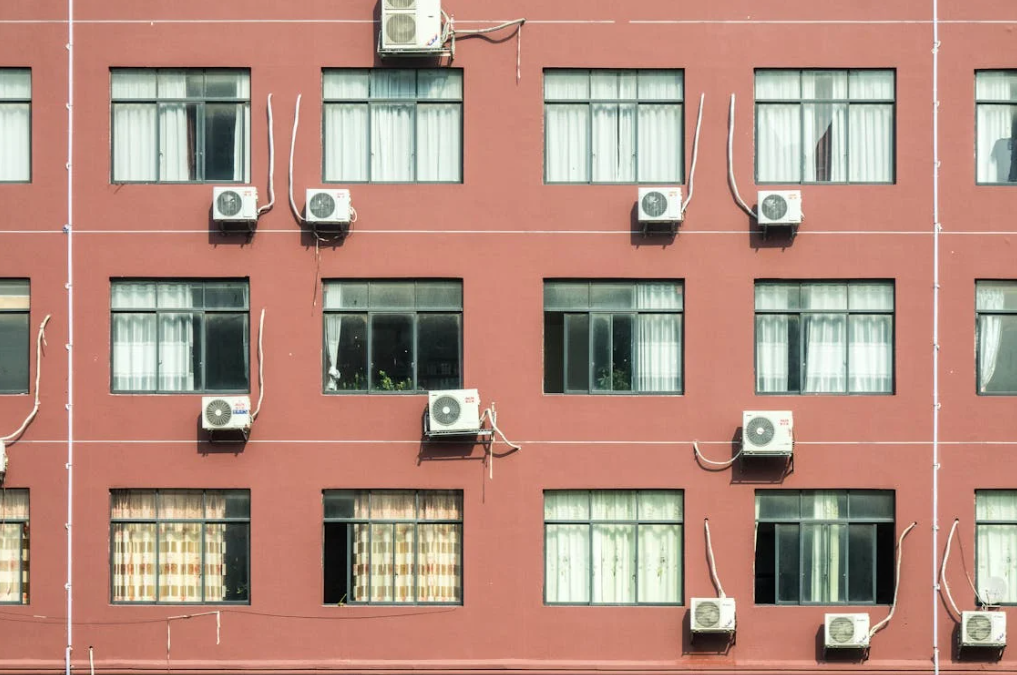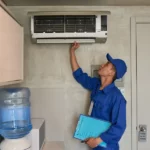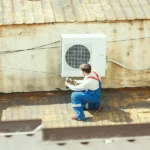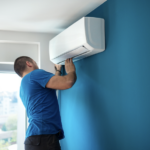Your air conditioning system relies on several key components to keep your space cool, and the air filter is one of the most important. While often overlooked, it plays a significant role in the system’s performance and the air you breathe.
So, what makes the function of the air filter so essential? How can regularly maintaining your air filters can prevent poor AC airflow? Let’s break it down.
What is an Air Filter and How Does It Work?
An air filter is a simple yet vital part of any air conditioning system. The function of an air filter is to trap dust, dirt, pollen, and other airborne particles that could otherwise circulate through your home or office. Imagine your air conditioner as the lungs of your building.
The air filter functions like a nose, filtering out the bad stuff before it enters the system. Without this filter, all those particles would end up in your air ducts, your indoor air, and eventually, your lungs.
Types of Air Filters
Air filters come in various types, each designed to suit different needs and air conditioning systems. Here’s a quick rundown:
- Fiberglass Filters: The most basic and affordable option, fiberglass filters are made of layered fiberglass fibers. They’re good for trapping large particles like dust and lint but don’t do much for smaller particles.
- Pleated Filters: These are a step up from fiberglass filters. Made of cotton or polyester, pleated filters have more surface area to trap particles, including some smaller ones like pollen.
- HEPA Filters: High-Efficiency Particulate Air (HEPA) filters are top-of-the-line when it comes to air filtration. They can trap up to 99.97% of particles, including tiny ones like mold spores and pet dander.
- Electrostatic Filters: These filters use an electric charge to attract and trap particles. They can be washable or disposable and are good for homes with pets or smokers.
- UV Filters: These use ultraviolet light to kill bacteria and viruses. While they aren’t effective at trapping particles, they’re great for improving overall air quality.
How Often Should You Replace Your Air Filter?
One of the most common questions people have is how often they should replace their air filters to keep the AC functioning properly. The answer depends on several factors, including the type of filter you use, the size of your home, and how much you use your air conditioning system.
- Fiberglass Filters: Typically need to be replaced every 30 days.
- Pleated Filters: Can last up to 90 days.
- HEPA Filters: Usually last about six months but may need more frequent replacement in homes with pets or allergies.
- Electrostatic Filters: Washable ones can be cleaned every month, while disposable ones should be replaced every 60-90 days.
If you have pets, allergies, or live in an area with high pollution levels, you might need to replace your filters more often. It’s always a good idea to check your filter once a month and replace it if it looks dirty.
The Role of Air Filters in Air Conditioning Systems
Air filters might seem like a minor component of your air conditioning system, but they actually play a significant role in how well your system performs. From keeping the air you breathe clean to protecting the internal parts of your AC unit, air filters are essential to maintaining a comfortable and healthy indoor environment. Let’s discuss further.
- Protecting Your AC System
Air filters aren’t just about keeping the air clean. They also play a crucial role in protecting your air conditioning system. When the filter gets clogged with dust and debris, it restricts airflow and prevents the AC from functioning properly. This means your AC system has to work harder to pull in air, leading to increased wear and tear on the components. Over time, this can cause parts of the system to break down prematurely, leading to costly repairs or even the need for a full replacement.
- Preventing Frozen Coils
One common issue that can arise from a dirty air filter is frozen coils. The evaporator coils inside your air conditioning unit are responsible for absorbing heat from the air. When airflow is restricted due to a clogged filter, the coils can get too cold and freeze. This not only reduces the efficiency of your AC system but can also cause damage to the coils themselves.
- Improving Energy Efficiency
A clean air filter allows your air conditioning system to operate more efficiently. When the filter is clean, air can flow freely through the system, allowing it to cool your home or office more effectively. This means your system doesn’t have to work as hard, which can lower your energy bills. According to the U.S. Department of Energy, replacing a dirty, clogged filter with a clean one can lower your air conditioner’s energy consumption by 5% to 15%.
- Enhancing Indoor Air Quality
Last but certainly not least, air filters play a key role in maintaining indoor air quality. The air inside our homes and offices can be more polluted than the air outside, thanks to dust, pet dander, smoke, and other pollutants. A good air filter helps trap these particles, keeping the air you breathe cleaner and healthier. This is especially important for people with allergies, asthma, or other respiratory conditions.
Common Mistakes to Avoid
When air filters are neglected, they can cause a range of problems that impact both your air conditioning system and your indoor air quality. Here are some of the most common mistakes people make with air filters and how you can ensure they function well.
- Using the Wrong Filter – Not all air filters are created equal, and using the wrong one can do more harm than good. For example, if your system isn’t designed to handle a high-efficiency filter like a HEPA filter, using one can restrict airflow and cause your system to work harder than it should. Always check your system’s specifications before choosing a filter.
- Neglecting Regular Maintenance – Another common mistake is neglecting to change the filter regularly. As mentioned earlier, a dirty filter can lead to all sorts of problems, from frozen coils to increased energy bills. Set a reminder to check and replace your filter regularly, especially during peak cooling seasons. For more information, here are reasons why HVAC preventive maintenance is crucial.
- Ignoring the Signs of a Problem – If you notice your air conditioning system isn’t cooling as well as it used to, or if your energy bills are suddenly higher than normal, it could be a sign that your air filter functions need attention. Don’t ignore these signs—taking action early can save you a lot of money and hassle in the long run.
Keep Your Air Filter and AC System in Top Shape
The function of the air filter may seem like a small part of your air conditioning system, but it plays a huge role in its overall performance and longevity. By keeping your filter clean and replacing it regularly, you can protect your system, improve energy efficiency, and maintain good indoor air quality.
If you find that your air conditioning unit isn’t working as it should, or if you’re not sure how to maintain your air filters, S&N Mechanical is here to help. Our team of experienced technicians can handle everything from routine maintenance to complex repairs, ensuring your AC system stays in top shape. Don’t wait until a minor issue becomes a major problem—contact us today to schedule your service.






